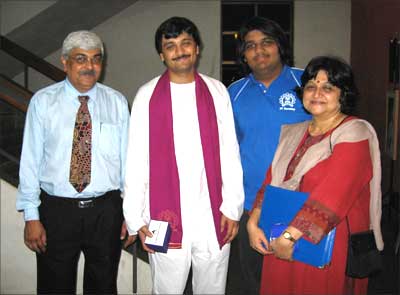 Rahul Bhattacharjee, topper of the M Tech dual degree course in civil engineering from IIT-Bombay, is ecstatic.
Rahul Bhattacharjee, topper of the M Tech dual degree course in civil engineering from IIT-Bombay, is ecstatic.
So is his family, and with a strong reason: they are now a family of four IIT-ians!
The IIT story for the Bhattacharjees started way back in 1973, when Rahul's father Palak joined IIT-Kharagpur for B.Tech. His mother Varsha Bhattacharjee did her MSc course at IIT-Kharagpur and PhD at IIT-Bombay. And his younger brother Pinaky has just joined IIT-Bombay.
Rahul's role model has always been his father, and he was determined to keep the family's 'IIT tradition' alive. Although the family wanted the younger one also to follow the IIT track, they never pressured him. "I used to feel so sorry for him, and I hoped that he would not be bogged down by the pressure. But fortunately, he worked really hard and we are all very happy that he got through the exam," says Varsha.
After clearing his exams with flying colours, Rahul is all set to leave for the United States to pursue his PhD at the Massachusetts Institute of Technology.
Ambitious and hardworking, Rahul has planned his career very well. Describing his stint at IIT as an awesome experience, he says that more than mere intelligence, it is hard work, focus, and perseverance that help you all the way. Rahul used to spend 8 to 9 hours studying everyday to see the IIT dream come true.
"After getting admission at the IIT, many students take it easy: they misuse the freedom and waste their time. It's important to not to lose focus and work hard all through your years at IIT," he points out.
The IIT saga in the family does not end here. What's more interesting is Palak's two brothers -- one of whom is his twin -- also did their post graduation from IITs.
Palak Bhattacharjee now works with UT Ltd, a hydraulics firm in Mumbai, while Varsha is a professor at the Mumbai University.
So how does it feel to be a family of IIT-ians?
"It feels good," says Varsha modestly. IIT also has a special significance for Palak and Varsha. It's where they met and decided to tie the knot.
Reminiscing his good old days at IIT-Kharagpur, Palak says it was great being at the IIT: the campus life was very active. . . full of fun. I used to play football and hockey. And it was good to be amongst so many toppers. The first year was a bit tough, but from the second year onwards everything was well settled. We had 32 students in our batch, only 13 were there in the final year!
How different was IIT then? "We had separate rooms at that time, so we had privacy which students don't get now. The B Tech course-duration was 5 years, now you get M Tech dual degree course in five years! In the entrance examination, physics, chemistry, maths and English were compulsory. Now English is not required."
He feels that IITs should improve on the infrastructure and develop more facilities. Setting up more IITs and introduction of OBC quota for admission to IITs will adversely affect the quality of these premier institutes, he says.
While many families strive to have at least one IIT-ian in the family, what is the secret behind this family's success?
Palak feels that parents put their kids under a lot of pressure these days. "The best way to get through the test is to be self-motivated. Unless you have the strong desire to study at IIT, it's very difficult. Of course, you have to put in a lot of hard work. I always allowed my children to do what they liked and my wife took good care of everything," he explains.
Yes, cut-throat competition and tremendous pressure from parents affects the students. So what does Varsha suggest?
"For Pinaky, he had his dad and brother's footsteps to follow in. But he worked really hard for it. Students should not be pitted against each other in the mad race to get admission. My children never went to any coaching centre. I have always ensured that I'm there whenever they need my help. I have always made sure that they have sufficient time to study. I always worked out things according to their convenience. We had to plan it very well. Of course, nourishment is also of great importance," she laughs.
Teaching comes naturally to her as she has been in the profession for decades. "It's a very good profession. I like teaching, it's good to be among young people because you also feel young!" says Varsha.
Varsha, who holds the Alexander von Humboldt Foundation Fellowship, has also been actively involved in research at the Mumbai University on various topics in the field of physics like magnetism, nano particles, and thin films, to name a few. The university gives them the flexibility to work on research projects.
"But we have to find our own funding agencies for research. I also work on collaboration with a German university, where I studied," says Varsha.
While younger brother Pinaky is getting accustomed to the IIT way of life, Rahul is upbeat on his next research at MIT. Calling it a great honour to be selected by MIT, he says, "We have a lot of ancient monuments in India. The restoration of these buildings is very cost-intensive. I plan to do research and build cost-effective solutions for the restoration of ancient monuments as well as damaged buildings in India."
"I will come back to India and start my own infrastructure development company," he enthuses.
(Above) The proud Bhattacharjees: From left to right, Palak, Rahul, Pinaky and Varsha.
Photograph: Manu A B





